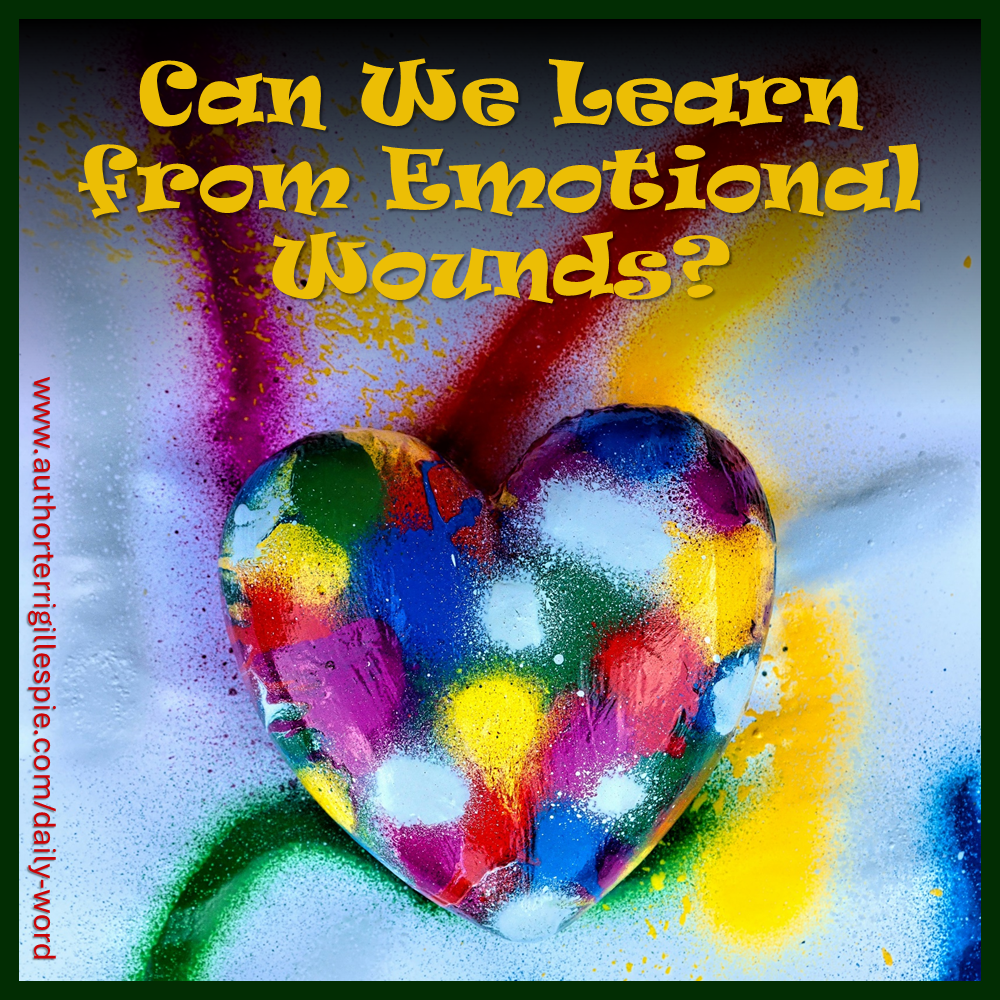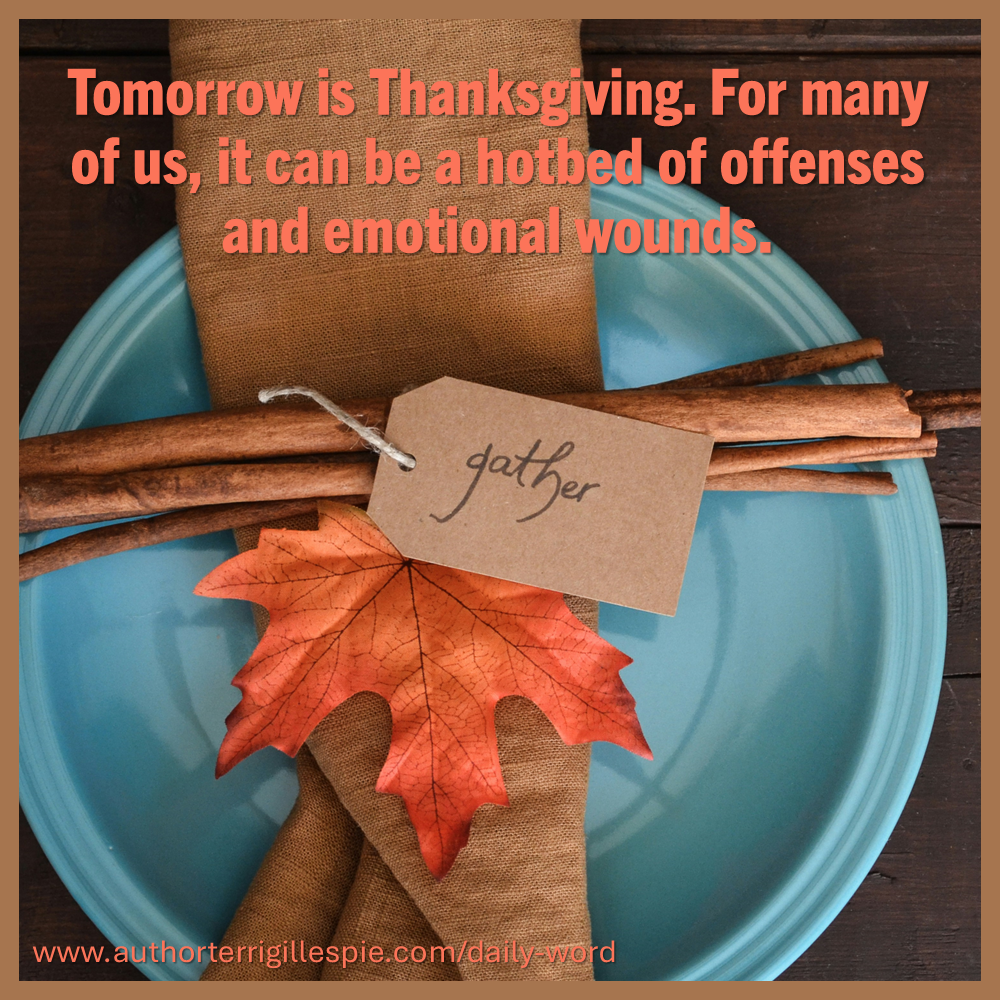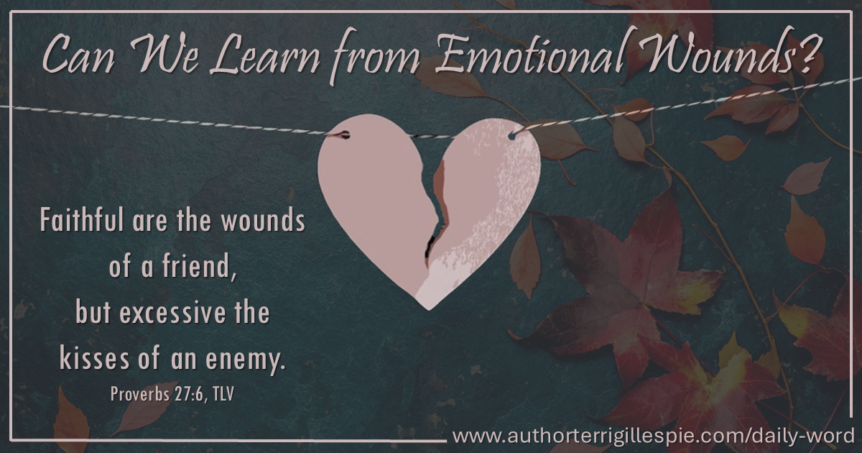Faithful are the wounds of a friend, but excessive the kisses of an enemy. Proverbs 27:6, TLV
 Can We Learn from Emotional Wounds? Preparing for Thanksgiving. True friendship, with a firm foundation, can overcome the deepest of wounds and become stronger and better for it. What we learn in the healing process is forgiveness, repentance, humility, grace, and mercy.
Can We Learn from Emotional Wounds? Preparing for Thanksgiving. True friendship, with a firm foundation, can overcome the deepest of wounds and become stronger and better for it. What we learn in the healing process is forgiveness, repentance, humility, grace, and mercy.
Someone who loves us, who unintentionally hurts us is different from someone who intentionally manipulates us. No matter how kind they seem, their motives are not to foster the type of friendship that is healthy. Instead, they push their wants and desires.
Wounds hurt regardless of who inflicts them, but our heavenly Father can use those hurts to move us closer to Him and each other. It’s important to remember it takes work to have a friendship and to overcome the hurts.
What About Family?
Tomorrow is Thanksgiving. For many of us, it can be a hotbed of offenses and emotional wounds. Especially if there are complicated and hurtful histories. We can’t change our history or other people—all we can do is change how we react and what we carry into the future.
of offenses and emotional wounds. Especially if there are complicated and hurtful histories. We can’t change our history or other people—all we can do is change how we react and what we carry into the future.
But what about tomorrow? Is there any way we can prepare? I think so. Here are some thoughts:
- Pray that our hearts would be open to what God might show us.
- We never know what God might do. Our nature is to protect ourselves, but we may be building an unnecessary wall.
- “For the weapons of our warfare are not fleshly but powerful through God for the tearing down of strongholds. We are tearing down false arguments and every high-minded thing that exalts itself against the knowledge of God. We are taking every thought captive to the obedience of Messiah— Ephesians 5:4-5, TLV
- Listen to those thoughts—those conversations and arguments and reruns of history. Acknowledge them as vain imaginations and the defensive walls that keep us from truly being present.
- If those thoughts bubble up, forgive, forgive, forgive.
- A fresh offense.
- Should we encounter a new offense we can handle it in one of two ways. Both have merit. Which one? That’s why praying up is important.
- Option 1: Calmly inquire if their comment was meant to hurt our feelings, or have we misunderstood what they said or their intent. Give them the space to explain. We’ll know if we misunderstood or if their intent was to indeed hurt us. If the latter is the case, follow option 2.
- Option 2: Ignore and calmly walk away. Praying, forgiving, and choosing to let it go. We may need to discuss it with them privately away from the turkey and pumpkin pie.
- Turn away from the traps.
- If we know that politics and religion are volatile topics—avoid the trap. Some family members enjoy the conflict. Best not to engage. I don’t know about you, but my family is already acquainted with my opinions. To give in to the temptation to enter the same argument is a waste of time. Have a helping of stuffing and let it go.
-
- This might surprise you. Help the hostess or if you are the host, busy yourself with serving. There’s something about positioning ourselves in the service of others that causes us to change our attitude. Plus, it can keep us from the verbal fray at the table.
 Equipping ourselves for a spiritual battle is always good. But keeping our heart open for positive possibilities may surprise us even more.
Equipping ourselves for a spiritual battle is always good. But keeping our heart open for positive possibilities may surprise us even more.
Think More About It
How do you prepare for family get-togethers? Does how to handle family hurts compare similarly to friend hurts? Why? Or why not?
Until tomorrow, may we learn from the wounds, my friends.
Praying for Israel
O come, let us sing for joy to ADONAI [the LORD].
Let us shout for joy to the rock of our salvation.
Let us come before His presence with thanksgiving.
Let us shout joyfully to Him with songs.
For ADONAI is a great God
and a great King above all gods. Psalm 95:1-3, TLV
Shall we sing this together? Know that brothers and sisters in Messiah join us. Amen! Halleluyah! God bless you!



